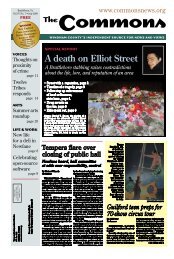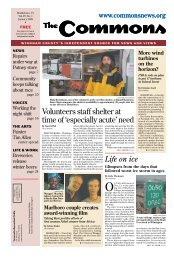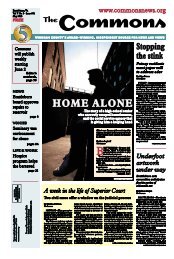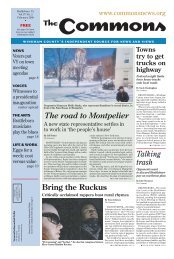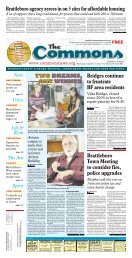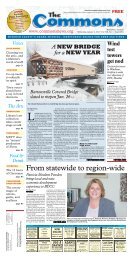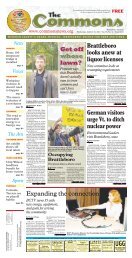voices - The Commons
voices - The Commons
voices - The Commons
Create successful ePaper yourself
Turn your PDF publications into a flip-book with our unique Google optimized e-Paper software.
18 VOICES <strong>The</strong> <strong>Commons</strong> • October 2008 <strong>The</strong> <strong>Commons</strong> • October 2008 VOICES 19<br />
the strap<br />
Author recounts the wacky world of corporal punishment<br />
Putney<br />
IF YOU THINK torture<br />
went out with the spanish<br />
Inquisition, you have no experience<br />
with the public school<br />
system in southern Ontario in<br />
the ‘50s and early ‘60s.<br />
Child abuse was as kosher<br />
as gefilte fish at King edward<br />
public school in Windsor. I was<br />
press-ganged into the place by<br />
my parents. at least I think they<br />
were my parents. Would my biological<br />
mother and father allow<br />
the fruit of their loins to be abandoned<br />
to the faculty-fiends at<br />
King eddie?<br />
King edward was four stories<br />
of red brick with concrete<br />
scrolls over the lintels and two<br />
Board of education–issue gargoyles<br />
perched above the front<br />
entrance. On each floor were<br />
classrooms, one the same as the<br />
next, with five rows of standardissue<br />
desks bolted to the floor<br />
with flip tops and inkwells on the<br />
upper right.<br />
Miss Cumafort, a rare woman<br />
whose head had been marinated<br />
in vinegar during her formative<br />
years, staffed the library<br />
and could give you a rash with<br />
just one piercing hiss for silence.<br />
Our sports program was<br />
a leather soccer ball lobbed into<br />
the playing field and monopolized<br />
by the toughest boys in<br />
school. Fists rather than finesse<br />
generally decided changes in<br />
possession.<br />
pUBLIC sCHOOL was the Cold<br />
War in microcosm. <strong>The</strong> teachers<br />
had various warring factions<br />
united only in their contempt for<br />
the student body. <strong>The</strong> students<br />
divided themselves into cliques<br />
by age, sex, and ability to fight.<br />
<strong>The</strong> glue that held the entire<br />
system together was rules, and<br />
the bottom line was “the strap.”<br />
going to the principal’s office<br />
to get the strap — a 1½-by-12inch,<br />
stiff leather quirt lashed<br />
across the palms of malefactors<br />
regularly in the 1950s — was<br />
an integral part of the educational<br />
process for nihilists, petty<br />
thieves, ruffians, blasphemers,<br />
and any others whose behavior<br />
10% OFF WITH THIS AD<br />
or academics were considered<br />
outside the Beaver Cleaver<br />
norm.<br />
My association with the strap<br />
was vigorous and frequent in<br />
those less-than-halcyon days.<br />
Not only was I considered lazy,<br />
irresponsible, and combative,<br />
but I was also cursed with an attitude<br />
problem.<br />
Rules governed both strapper<br />
and victim. Crying was out. You<br />
just didn’t cry; it was unmanly,<br />
and it let the strapper know that<br />
he had broken your will. <strong>The</strong><br />
second rule was more practical.<br />
It called for a motionless presentation<br />
of the hand. If you resisted<br />
and only tasted a partial cut of<br />
the leather, you would receive it<br />
again. <strong>The</strong> victim was much better<br />
off not to flinch, but to stand<br />
(like a man) rock steady to take<br />
his licks.<br />
I would like to apologize to<br />
female readers for my lack of<br />
feminine pronouns and references.<br />
at this stage of Canadian<br />
educational development, girls<br />
did not get the strap. If they behaved<br />
in the same philistine<br />
manner as the boys, they were<br />
removed from school and sent<br />
to convents or put on a program<br />
of Thorazine-based narcotics.<br />
<strong>The</strong> master of the strap at<br />
King edward was peter Miller<br />
Mitchell, the principal, a mildlooking<br />
man resembling a bank<br />
vice-president, but who was lethal<br />
and legendary in strapping<br />
circles and proud of it. I know<br />
his middle name from frequent<br />
readings of a framed copy of his<br />
degree from the University of<br />
Toronto which hung in the anteroom<br />
of his lashing chamber.<br />
Mr. Mitchell, roundish but<br />
not obese, stood about 5’5” and<br />
had thin brown hair heavily brilliantined<br />
and plastered to an<br />
unblemished cueball-shaped<br />
<strong>The</strong> Good Buy Store<br />
JIm<br />
AuSTIn<br />
<br />
<br />
Clothing, household, furniture, antiques and collectibles.<br />
We pick up furniture donations — call for details<br />
<br />
10% OFF WITH THIS AD<br />
<br />
<br />
P.O. B <br />
<br />
skull. Imagine an adult Charlie<br />
Brown with the eyes of a cobra<br />
and the voice of Basil Rathbone.<br />
THe MOsT DRaMaTIC strapping<br />
in King edward history did<br />
not happen to me, but it was an<br />
event I will never forget.<br />
It all began with a schoolyard<br />
scuffle between myself<br />
and another boy, Big Mike,<br />
who weighed about 175 pounds<br />
and stood all of 4 feet tall lying<br />
down. Big Mike remarked that<br />
Mary Kay Boyd, the young lady<br />
with whom I was in love, had<br />
“boobs like mosquito bites.”<br />
While this was accurate it was<br />
not a statement that could go<br />
unchallenged.<br />
after the obligatory name-calling<br />
we set about pushing, which<br />
led to rolling on the ground and<br />
culminated in Big Mike squatting<br />
like a prepubescent Buddha<br />
on my xiphoid process. at this<br />
juncture Howard Weeks, my<br />
best friend and a consummate<br />
dweeb, committed the one aggressive<br />
act of his 11-year-old<br />
life. Howard, a young Barney<br />
Fife but without Barney’s prickly<br />
hostility, reached down, grabbed<br />
a handful of Big Mike’s hair, and<br />
pulled.<br />
at this moment Mr. Thomas,<br />
our reptilian playground monitor<br />
and homeroom teacher,<br />
glanced over at us. His mouth<br />
drew back toward his ears, exposing<br />
an overlapping jumble of<br />
lunch-laden teeth in a murderous<br />
scowl. Dandruff the size of<br />
corn flakes avalanched to his<br />
shoulders as he trembled with<br />
righteous indignation, choosing<br />
to see two boys beating on one.<br />
Never mind that the one made<br />
three of the two or that the one<br />
was winning. It was two against<br />
one — the code had been broken.<br />
It was the strap for Howard<br />
and me.<br />
Now I could accept this verdict,<br />
unfair though it was; my<br />
personal ledger in crimes<br />
against humanity for the month<br />
showed a credit balance. This<br />
strapping would just about balance<br />
the books.<br />
Howard, on the other hand,<br />
was a boy of an entirely different<br />
stripe. all of our playground<br />
ethics and “be-a-man” mentality<br />
meant nothing to him. He<br />
begged, groveled, and wheedled<br />
like a child possessed. He<br />
blamed everything on me, then<br />
everything on Mike and finally<br />
on fate for casting him into this<br />
desperate situation.<br />
How little he knew of the<br />
psychology of playground<br />
monitors and principals. Both<br />
Mr. Thomas and Mr. Mitchell<br />
endured Howie’s tirade with<br />
ill-disguised expressions of disgust.<br />
all he accomplished by<br />
spilling his guts was the dubious<br />
honor of being first under<br />
the lash.<br />
THe pRINCIpaL made a few<br />
cursory remarks about the evils<br />
of fighting but concentrated<br />
mainly on the drama of removing<br />
the strap from his desk<br />
drawer and lashing a few practice<br />
swings in the air before a<br />
thoroughly blanched Howard.<br />
Mr. Mitchell encircled Howard’s<br />
quivering wrist with his left hand<br />
and reared back for stroke number<br />
one.<br />
Don’t flinch, Howie, I<br />
thought, as the strap descended.<br />
at that moment, in an act<br />
of appalling cowardice, Howard<br />
jerked his hand free of the<br />
principal’s grip. <strong>The</strong> strap whistled<br />
by his withdrawn mitt and<br />
landed with a crack like a pistol<br />
shot on Mr. Mitchell’s knee. Our<br />
fuehrer’s eyes bugged out like<br />
organ stops from the exquisite<br />
pain of his tortured patella.<br />
Mr. Thomas stared at the<br />
overhead light fixture as if it<br />
held great significance. Immediately<br />
his face cleared of all<br />
emotion and resumed a newtlike<br />
malevolence. Without a<br />
word he garroted Howard’s<br />
wrist in a grip that made his fingers<br />
balloon with trapped fluids.<br />
Don’t cry, Howard, I thought,<br />
but the chances of that were nil.<br />
at this point I could only hope<br />
that Howie’s sphincters would<br />
hold up.<br />
Mr. Mitchell fairly came off<br />
the ground delivering that first<br />
THE PUTNEY FOOD COOP<br />
Full Grocery Store<br />
ORGANIC PRODUCE<br />
Sandwiches Daily Hot Bar Salad Bar<br />
main street, putney vt<br />
(802) 387-5866 www.putneycoop.com<br />
stroke to Howard’s bloodless<br />
palm. Before the nerves in Howard’s<br />
hand had even registered<br />
the excruciating pain they were<br />
about to receive, he burst into<br />
tears. That initial burst launched<br />
a mortar shell of verdant snot<br />
across the span between victim<br />
and disciplinarian.<br />
Time seemed suspended as<br />
the mucus blob tumbled in slow<br />
motion and landed squarely on<br />
the principal’s pin-striped lapel,<br />
where it lodged, glistening<br />
contemptuously.<br />
Mr. Mitchell glanced down,<br />
face ashen, lips working feverishly,<br />
gibbering inaudible oaths.<br />
a glare of unimaginable loathing<br />
passed palpably between<br />
him and the slobbering cur that<br />
was Howard Weeks. To clean<br />
off the snotball would be to acknowledge<br />
that this atrocity had<br />
indeed happened. It stayed to<br />
bear witness.<br />
Mr. Mitchell’s face assumed<br />
a greasy, gray quality not unlike<br />
liver left for hours in a tropical<br />
sun. Like a Cronenberg metamorphosis,<br />
his collar points<br />
stood at attention while his neck<br />
purpled and pulsated visibly,<br />
threatening to snap his essex<br />
golf and Country Club tie. He<br />
then laid on with a jihad-like vengeance:<br />
six on each, unheard<br />
of in the annals of corporal punishment<br />
in the Ontario public<br />
school system.<br />
Howard could easily have become<br />
a folk hero had it not been<br />
for his otherworldly screeching<br />
and blubbering that accompanied<br />
the strokes. Howard did<br />
not react to the individual blows.<br />
He wailed a prolonged bleat<br />
that rose in volume and pitch to<br />
be guttered in chest-crunching<br />
sobs.<br />
My turn was of no consequence.<br />
Two on each, delivered<br />
by a pale and wheezing principal.<br />
I didn’t even bother to run<br />
water from the cold fountain<br />
over my hands.<br />
HOWaRD MIsseD sCHOOL<br />
the next day and when he returned<br />
he wasn’t the same. He<br />
looked and acted like a marginal<br />
character in Night of the Living<br />
Dead. He recovered most of his<br />
faculties after the summer holidays,<br />
but the scars of Mitchell<br />
justice were not easily salved<br />
or quickly forgotten. Howard’s<br />
mirth at games and jokes<br />
seemed strained or fraudulent<br />
like a recently released mental<br />
patient trying to prove that the<br />
therapy had worked.<br />
<strong>The</strong> strap is a thing of the past<br />
nowadays, and that is a good<br />
thing. It did nothing for me save<br />
make me resentful and suspicious<br />
of authority. I’ve lost touch<br />
with Howie, but I’ll guarantee<br />
you that strapping still stands<br />
out in his memory.<br />
Like a loogie on a lapel,<br />
I’ll wager. n<br />
Jim Austin, a regular Voices<br />
columnist, can be reached at<br />
jim@commonsnews.org.<br />
Reading — and thinking —<br />
through life in Vermont<br />
Williamsville<br />
In graduate school, I worked<br />
my way through elizabethan<br />
Drama, the British<br />
Novel and the Romantic poets<br />
at the rate of two to three books<br />
a day. In addition, I read innumerble<br />
critical works as well as<br />
<strong>The</strong> New York Times, <strong>The</strong> New<br />
Yorker, and <strong>The</strong> New York Review<br />
of Books. I spent most of<br />
my days reading.<br />
Occasionally, I’d come up for<br />
air to meet with the professor<br />
directing my graduate work. I<br />
remember well one overcast,<br />
autumn day. I arrived in his disheveled<br />
office, cluttered with<br />
books. <strong>The</strong> place appeared dim;<br />
it’s quite likely the windows<br />
hadn’t been washed since the<br />
publication of george eliot’s<br />
Middlemarch, in 1874.<br />
<strong>The</strong> professor sucked on his<br />
pipe as he listened to me recite<br />
the titles of my week’s reading,<br />
and then, in a grand puff of<br />
smoke, cleared his throat and<br />
said, “Reading ain’t thinking,<br />
you know.”<br />
This is the sort of enigmatic<br />
education one receives in a prestigious<br />
Ivy League graduate<br />
program where, in return for a<br />
job teaching insolent freshmen<br />
(Columbia didn’t go co-ed until<br />
1983), one receives just enough<br />
cash to stay marginally housed<br />
and fed.<br />
I understood what the guy<br />
meant: he wanted me to write<br />
papers, proving I could not only<br />
read but think. so write I did. I<br />
Saxtons River<br />
mY KaRMa ran over<br />
my dogma.” That<br />
was one of my favorite<br />
bumper stickers years ago<br />
(along with “Uppity Women<br />
Unite”). <strong>The</strong> clever tagline resonated:<br />
I was a post-adolescent<br />
struggling with <strong>The</strong> Meaning<br />
of Life (especially mine), and<br />
somehow the slogan spoke to<br />
me in a way that suggested I<br />
should be less serious in my<br />
quest for my personal Nirvana.<br />
I have been thinking about<br />
karma a fair amount since finding<br />
myself back in asia, and to a<br />
lesser extent I’ve also been contemplating<br />
dogma. This happens<br />
when I am in a Buddhist environment,<br />
so to a certain extent<br />
this reflection constitutes a reprise<br />
of an essay I wrote back in<br />
2005 when I lived in Thailand.<br />
This time, however, I am in Indonesia<br />
— a primarily Muslim<br />
nation — at the site of its answer<br />
to Cambodia’s angkor Wat and<br />
Burma’s pagan. That is to say, I<br />
have just visited Borobudur, an<br />
extraordinary 9th-century Buddhist<br />
temple ruin that rises out<br />
of the earth like a huge sand<br />
castle. It has withstood earthquakes,<br />
time, and terrorism,<br />
and its survival speaks to the<br />
very essence of Buddhist philosophy,<br />
which underscores a<br />
kind of grace, acceptance, and<br />
forbearance.<br />
dEBORAH<br />
LEE<br />
LuSKIn<br />
wrote a dissertation, “Jane austen<br />
and the Limits of epistolary<br />
Fiction.” I received my ph.D.,<br />
which is like being admitted to<br />
a highly secretive club of pipesmokers<br />
who spend their days<br />
in cluttered offices with dirty<br />
windows.<br />
THIs pReTTY WeLL describes<br />
my current office, except for<br />
the pipe smoking — and the<br />
students. I’ve been fortunate<br />
enough to slide out of the mainstream,<br />
and to have patched<br />
together a job teaching literature<br />
to a much wider audience<br />
than is generally found in an<br />
institute of higher learning. I<br />
teach lifelong learners — ordinary<br />
Vermonters from all walks<br />
of life who like both to read and<br />
to think.<br />
It may have taken me 20 years<br />
to understand what my professor<br />
meant by “reading ain’t<br />
thinking,” but the people who<br />
attend any of the programs I<br />
teach for the Vermont Humanities<br />
Council understand that we<br />
can read and read and read and<br />
never feel sated, never fill up —<br />
and never move on. To make<br />
reading meaningful, we need to<br />
Reflections on balance<br />
ELAynE<br />
CLIFT<br />
THe THINg that got me thinking<br />
about karma and dogma<br />
and the possible relationship<br />
between the two from a Western<br />
perspective was our guide’s<br />
explanation of the symbolism<br />
in the carved stone friezes<br />
that wrap around the temple of<br />
Borobudur.<br />
<strong>The</strong>se amazing sculpted episodes<br />
recount the story of<br />
Buddha’s journey to enlightenment.<br />
<strong>The</strong>y are laden with<br />
lessons of patience, rightful<br />
thinking and behaving, and the<br />
continual search for balance.<br />
<strong>The</strong> idea of life’s cycles — large<br />
and small — is preeminent.<br />
It stuck me quite powerfully in<br />
contemplating the eastern view<br />
of the cycles of life that we in the<br />
West may have things all wrong.<br />
eastern philosophies seem<br />
to emphasize the search for<br />
balance — yin and yang or whatever<br />
— as a natural part of life.<br />
For them, it’s an ongoing search<br />
in the daily course of things to<br />
get it right. For us, every upset<br />
is a crisis.<br />
In the east, it seems to me,<br />
people don’t agonize all the time<br />
think about it.<br />
<strong>The</strong> readers who attend the<br />
VHC’s Reading and Discussion<br />
programs already know this.<br />
That’s why they come. While<br />
reading is something we each<br />
do alone, thinking is something<br />
we need to do together. and this<br />
is what I’ve witnessed in 20-odd<br />
years of Reading and Discussion<br />
programs: Neighbors coming<br />
together to think through what<br />
it is they’ve read, to discover and<br />
clarify what it is they think.<br />
sometimes, readers come in<br />
with questions and uncertainty,<br />
and sometimes, readers come in<br />
with attitude. as a facilitator, I always<br />
hope for a mix of both. and<br />
if we have a really good discussion,<br />
the questioners leave with<br />
a little more certainty, and those<br />
with attitude leave with a little<br />
less. everyone gains.<br />
FOR THe pasT YeaR, a group<br />
of intrepid readers has tackled<br />
brick-sized biographies of<br />
american presidents and met<br />
monthly to discuss the presidency.<br />
This year-long enterprise,<br />
sponsored by the Vermont Humanities<br />
Council and Brooks<br />
Memorial Library, has led us to<br />
a better understanding of american<br />
history, the political process,<br />
and the evolution of presidential<br />
power. By talking and listening<br />
with others, we have been<br />
able to develop our own understanding<br />
of presidential politics.<br />
Ultimately, this study has made<br />
us better-informed citizens,<br />
about the big Cycle of Life stuff,<br />
or for that matter about the simple<br />
cycles we all go through,<br />
whether in terms of job stresses,<br />
family dynamics, or romantic<br />
relationships. <strong>The</strong>y just get on<br />
with it and hope to regain their<br />
balance when things get out of<br />
whack.<br />
We, on the other hand, make<br />
a major megillah of life’s every<br />
challenge. We agonize, articulate<br />
angst, vent our anger. We<br />
read normal, temporary imbalance<br />
— the dips of daily living<br />
— as deviant, depressing, a recipe<br />
for despair. We get way out<br />
of proportion when all we really<br />
need to do, maybe, is get a grip<br />
and get on with it.<br />
I DON’T MeaN to suggest that<br />
no one in asia is ever depressed<br />
— nothing breeds depression<br />
like poverty and powerlessness<br />
— or that there’s no such thing<br />
better able to participate in the<br />
political process.<br />
In anticipation of the upcoming<br />
election, our reading and<br />
discussion group will end this<br />
month with the Declaration of<br />
Independence on Oct. 22, and<br />
the Constitution on Oct. 29.<br />
Vermont has a national reputation<br />
as a state of independent<br />
thinkers and voters. I don’t know<br />
if it’s Vermonters’ independence<br />
that accounts for our ideas or<br />
if it’s our interest in ideas that<br />
makes for our independence. I<br />
do know that Vermont’s a small<br />
state; nevertheless, the Vermont<br />
Humanities Council sponsors<br />
close to 2,000 programs a year.<br />
a lot of them happen in Brattleboro,<br />
the cultural center of<br />
perhaps the most independentthinking<br />
county in the state.<br />
In addition to programs at<br />
Brooks Library, the Vermont<br />
Humanities Council will sponsor<br />
a program on Robert Frost<br />
at this month’s Brattleboro<br />
Literary Festival (www.brattleboroliteraryfestival.org)<br />
and<br />
will partner with the Brattleboro<br />
Community Justice Center<br />
to pilot a Justice and Literature<br />
Reading and Discussion series<br />
to be held at the Brattleboro<br />
savings and Loan’s Community<br />
Room.<br />
Building on the idea that reading<br />
literature primes people’s<br />
minds, we’re going to read stories<br />
which deal with the issues<br />
of justice and revenge.<br />
Detective fiction, murder mysteries<br />
and courtroom drama<br />
are all popular literary genres;<br />
people like reading about murder<br />
and mayhem — as long as<br />
law and order are ultimately restored.<br />
Using archer Mayor’s<br />
Open Season, Castle Freeman’s<br />
Go With Me, and David guterson’s<br />
Snow Falling on Cedars,<br />
as deviance from social norms in<br />
this part of the world.<br />
I’m just wondering if our penchant<br />
for pathology and personal<br />
introspection isn’t leading us<br />
away from the very thing they<br />
endlessly scrutinize — a sense<br />
of balance about the world and<br />
our place in it. Maybe we place<br />
too much emphasis on the<br />
dogma of our psychology gods<br />
and not enough on the karmic<br />
lessons of the larger cosmos.<br />
we will discuss issues of justice:<br />
what it is, how it works, what<br />
happens when it doesn’t, how<br />
society metes it out, how society<br />
might do better. In short, we’ll<br />
read imaginary literature and<br />
we’ll think about hard issues.<br />
This model of using literature<br />
to start important conversations<br />
about difficult issues is being<br />
used in health care as well, not<br />
only in Vermont, but nationally.<br />
Until recently, there was a Literature<br />
and Medicine program for<br />
health-care workers at Brattleboro<br />
Memorial Hospital. It was a<br />
well-attended and highly appreciated<br />
oasis of humanity for all<br />
members of the medical establishment,<br />
where they gathered<br />
to discuss aspects of health care<br />
outside the crucible of patient<br />
care.<br />
Unfortunately, the program<br />
has not been funded for the<br />
coming year. In a health-care<br />
system taken over by the beancounters,<br />
there’s little place for<br />
anything that doesn’t generate<br />
revenue, like the humanities.<br />
I know: I went to graduate<br />
school to figure out how to read<br />
for a living. Twenty years later,<br />
I’m still trying to figure out<br />
how to support myself. In the<br />
meantime, I’m reading — and<br />
thinking — my way through a<br />
very rich life indeed. n<br />
Deborah Lee Luskin (deb@<br />
commonsnews.org) is a regular<br />
Voices columnist. For more<br />
information on the Vermont<br />
Humanities Council programs,<br />
visit www.vermonthumanities.<br />
org. Check out the programs at<br />
the Brooks Memorial Library at<br />
www.brooks.lib.vt.us.<br />
places like Borobudur make<br />
you think about such things.<br />
It’s a great venue to visit. Who<br />
knows? You might even decide<br />
you’d like to “live” there. n<br />
Elayne Clift, a regular Voices<br />
columnist, has just returned<br />
from three months of traveling<br />
and writing in Thailand and<br />
Indonesia. She can be reached<br />
at elayne@commonsnews.org.<br />
Professional Video<br />
Production<br />
• Superior Shooting & Editing<br />
• DVD Production & Authoring<br />
• Web & CD-Rom Video<br />
• DVD Duplication & Replication<br />
• Format Transfer Services<br />
(802) 254-2800



